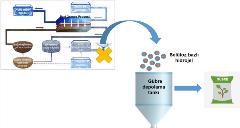Project Title: Investigation of Applicability of Hydrogels Functionalized with Fertilizer-Drawn Forward Osmosis in Ecological and Smart Agriculture
Project Type: İTÜ/MEM-TEK and TÜBİTAK Project
Project Coordinator: Dr. Mehmet Emin Paşaoğlu
The agricultural industry is the main consumer of global freshwater and utilizes fertilizer to meet food demands. With an abundance of saline water globally, desalination will be a major contributor to solving the global freshwater crisis. In times of ever-increasing water scarcity, membrane-based desalination has been sought among the most efficient desalination processes available. Forward osmosis (FO) has widely been explored for its application in water desalination, especially as an energy-efficient and economical alternative to conventional membrane-based desalination. Currently, FO technology has been increasingly studied and applied for agricultural purposes. Fertilizer-drawn forward osmosis (FDFO) has garnered immense attention for its application in the agriculture field and its potential to reuse saline water sustainably.
Unfortunately, the FDFO system still encounters challenges of the unavailability of suitable membranes for the FO process. FDFO using thin film composite (TFC) FO membranes have been shown to have better solute rejection as well as reduce energy consumption and membrane replacement cost as compared to the commercial FO membrane (CTA membrane). Nevertheless, there are few limitations faced by TFN membranes. These include low water flux and high reverse solute flux (RSF). Numerous research studies have been carried out on fabrication and modifications of the thin film composite forward osmosis TFC-FO membrane using novel materials and additives, different polymers and concentrations, and altering the characteristics of the selective layer. In this study, the development of FO membrane incorporated with organic-inorganic nanomaterials of the metal organic framework (MOF) on porous membrane support is proposed. Different types of MOF and loading ratios on the different modules of porous membrane support (flat sheet and hollow fiber) will be tested and the physicochemical analysis will be conducted using various characterization analyses. The performance of the fabricated thin film nanocomposite (TFN) membrane will be evaluated in terms of salt rejection, water flux, reverse solute flux, and long-term stability. It is envisaged that the new type of FO membrane developed in this study could significantly increase water flux and while minimizing the RSF desirable for fertigation applications. Diluted liquid fertilizer is given with controlled drip irrigation in common use. But, the rate of giving an amount of fertilizer could not be controlled with this system. So, it is needed to apply a controlled release technology to overcome this problem. For this reason, fertilizer encapsulated hydrogel beads will be formed for the controlled release fertilizing.
